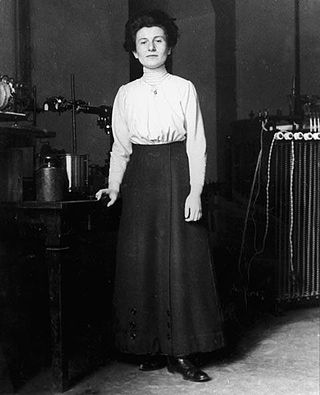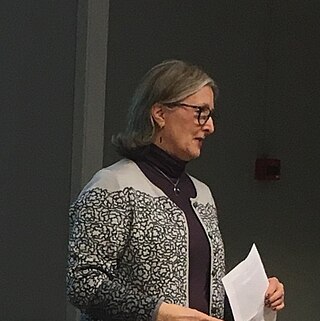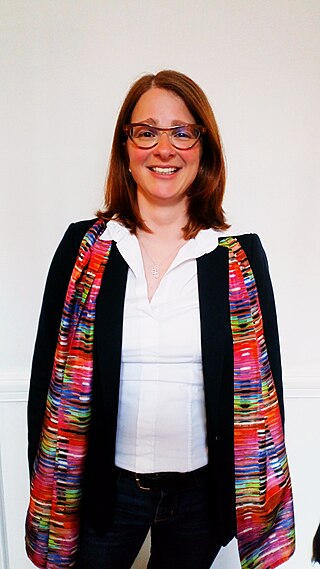Related Research Articles

Princess Chulabhorn of Thailand, the Princess Srisavangavadhana is a princess of Thailand, the youngest daughter of King Bhumibol Adulyadej and Queen Sirikit, and the younger sister of King Vajiralongkorn. She is officially styled Her Royal Highness Princess Chulabhorn, which corresponds to her full Thai title Somdet Phrachao Nong Nang Thoe Chaofa Chulabhorn Walailak Agrarajakumari.

Hedwig Kohn was a physicist who was one of only three women to obtain habilitation in physics in Germany before World War II. Born in Breslau in the German Empire, she was forced to leave Germany during the Nazi regime because she was Jewish. She continued her academic career in the United States, where she settled for the rest of her life.

Hertha Sponer was a German physicist and chemist who contributed to modern quantum mechanics and molecular physics and was the first woman on the physics faculty of Duke University. She was the older sister of philologist and resistance fighter Margot Sponer.
St. Ephrem Ecumenical Research Institute (SEERI) is a centre for Syriac studies located in Kottayam, Kerala. It is a research centre of the Mahatma Gandhi University, Kottayam,
Dr. Regina Bendix is a professor of European Ethnology at the University of Göttingen, Germany.

Göttingen Observatory is a German astronomical observatory located in Göttingen, Lower Saxony, Germany.

Astromundus was a 2-years Erasmus Mundus masters course in Astronomy and Astrophysics. It was offered by a consortium of 5 partner universities of four different European countries. Partner universities were University of Innsbruck in Austria, University of Padova and University of Rome Tor Vergata in Italy, University of Göttingen in Germany and University of Belgrade in Serbia. Belgrade was a third country partner of this consortium.

Werner Landgraf is a German astrophysicist and a discoverer of minor planets.

Smadar Naoz is an Israeli-American astrophysicist, and was the 2015 winner of the Annie Jump Cannon Award in Astronomy for her scientific contributions to the fields of cosmology and planetary dynamics.

Anneli Pirjo Marjukka Aejmelaeus is professor emerita of Old Testament and Ancient Near Eastern Culture and Literature in the Faculty of Theology at the University of Helsinki, and is the vice-director of the Academy of Finland Centre of Excellence "Changes in Sacred Texts and Traditions". Before this, she held from 1991 to 2009 the position of Professor of Old Testament and Septuagint Research in the Faculty of Theology at the University of Göttingen. In addition, from 1993 to 2000, Aejmelaeus was the Director of the research institute "Septuaginta-Unternehmen" at the Göttingen Academy of Sciences and Humanities.
The Göttingen Faculty of Theology is the divinity school at the University of Göttingen, officially denominated the "United Theological Departments" but commonly referred to as the "Theological Faculty" . It was instituted at the foundation of the University, in 1737, along with the three other original faculties of Law, Medicine, and Philosophy. Over the centuries, the Göttingen Faculty of Theology has been home to many influential scholars and movements, including the rise of historical criticism, Ritschlianism, the History of Religions School, and Dialectical Theology. Its members were also involved in the Göttingen School of History.

Lieve Van Hoof is a Belgian classical scholar and Research Professor at the University of Ghent. She specialises in work on the socio-political role of Greek and Latin literature in the Roman Empire. Van Hoof is currently engaged in examining Greek and Latin letters in order to understand lobbying in late antiquity. Van Hoof is known in particular for her work on Plutarch and Libanius.
Inmaculada Martínez-Zarzoso is a Spanish economist and currently a professor and the chair of economic development at the University of Göttingen.
Inke Siewert is a professor for Inorganic Chemistry at University of Göttingen. Her research focuses on activation of small molecules by transition metal complexes and molecular electrochemistry.
Tatjana Tchumatchenko is a physicist in the field of theoretical neuroscience. She is an independent Max Planck Group Leader and, since November 2020, professor for Computational Neuroscience of Behavior at the Faculty of Medicine of the Rheinische Friedrich-Wilhelms-Universität Bonn (Germany). In her research she investigates how neural networks compute and how particular activity patterns emerge from synaptic and neuronal features.
{{Infobox scientist | name = Marina Bennati | workplaces = [[Max Planck Institute for multidisciplinary Sciences]
[University of Göttingen]]
Goethe University Frankfurt
Massachusetts Institute of Technology | alma_mater = University of Stuttgart
University of Münster | thesis_title = Zeitaufgelöste Elektronen-Spin-Resonanz an photoangeregten Zuständen spezieller Donor-Akzeptor-Systeme | thesis_url = http://www.worldcat.org/oclc/258062810 | thesis_year = 1995 }}

For the predecessor of UCASS, please see Graduate School of Chinese Academy of Social Sciences
Stephan Johannes Klasen was a German development economist and professor of economics at Georg August University in Göttingen. He was also director of the Ibero-America Institute for Economic Research and founder of the Courant Research Center "Poverty, Inequality, and Growth in Developing and Transition Countries". He was a member of the UN Committee on Development Policy, president of the European Development Research Network, and a member of the Intergovernmental Panel on Climate Change for the 5th Assessment Report.

Margot Sponer was a German philologist, teacher, freelance translator, and resistance fighter. She worked as a lecturer of Spanish at Friedrich Wilhelm University from 1929 to 1932, and again from 1937 to 1942. After her dismissal from the university, Sponer worked as a freelance translator while she was active in the resistance to Nazism, using her international contacts to help people escape from government persecution, which she was arrested for in 1942. She reportedly died in 1945 after being dragged out of her home and shot by members of the Schutzstaffel during the Battle of Berlin. She was the younger sister of physicist and chemist Hertha Sponer.
References
- 1 2 Öffentlichkeitsarbeit, Georg-August-Universität Göttingen-. "Presseinformationen - Georg-August-Universität Göttingen". www.uni-goettingen.de (in German). Retrieved 17 May 2020.
- ↑ Meylan, Georges (11 November 2013). QSO Absorption Lines: Proceedings of the ESO Workshop Held at Garching, Germany, 21–24 November 1994. Springer Science & Business Media. p. 82. ISBN 978-3-540-49458-4.
- ↑ Öffentlichkeitsarbeit, Georg-August-Universität Göttingen-. "Presseinformationen - Georg-August-Universität Göttingen". www.uni-goettingen.de (in German). Retrieved 17 May 2020.
- ↑ "Homepage of Galaxy Evolution (Galev) Group, Centre for Astrophysics Research, University of Hertfordshire". members.galev.org. Retrieved 17 May 2020.
- ↑ "International Astronomical Union | IAU". www.iau.org. Retrieved 17 May 2020.